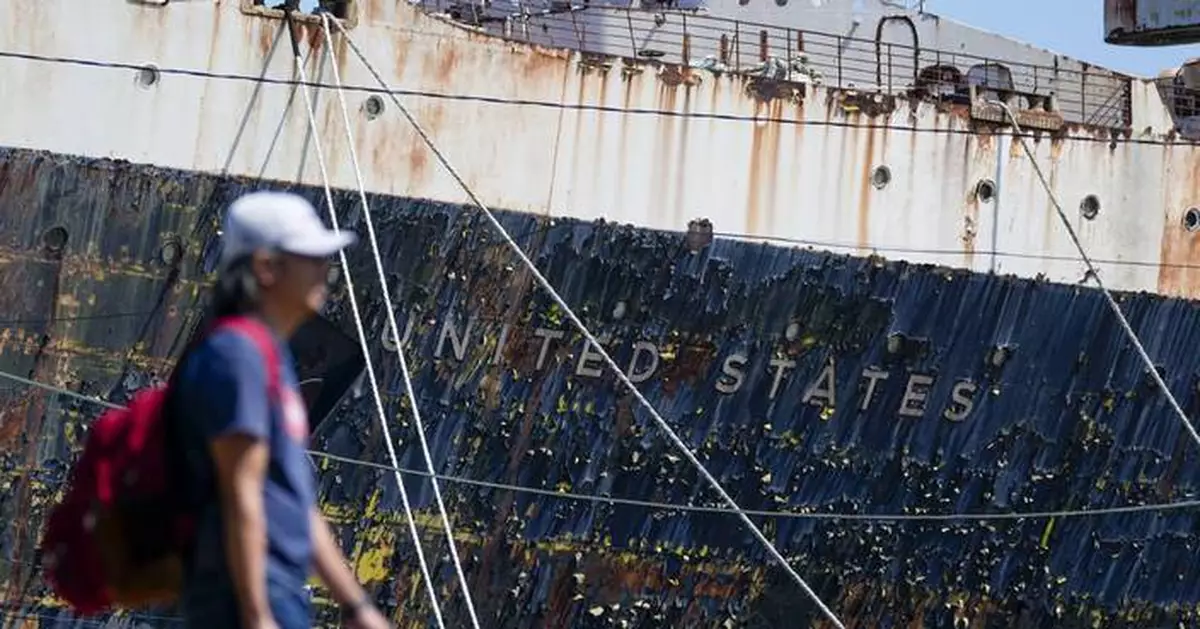The conservancy that oversees a storied but aging ocean liner and its landlord are headed to mediation as they attempt to resolve a years-old rent dispute that could force the historic ship out of its berth on the Delaware River in Philadelphia.
A federal judge had ruled in June that the conservancy had until Thursday to present plans to move the SS United States, a 1,000-foot ocean liner that still holds the transatlantic speed record it set more than 70 years ago. That deadline, though, came and went after the conservancy filed a lawsuit Wednesday that accused Penn Warehousing of sabotaging its efforts to sell the vessel. The group also asked U.S. District Judge Anita B. Brody to extend the plan deadline to Dec. 5.
Click to Gallery
Vehicles move past the S.S. United States moored on the Delaware River in Philadelphia, Wednesday, Sept. 4, 2024. (AP Photo/Matt Rourke)
A person runs past the S.S. United States moored on the Delaware River in Philadelphia, Wednesday, Sept. 4, 2024. (AP Photo/Matt Rourke)
The S.S. United States is moored on the Delaware River in Philadelphia, Wednesday, Sept. 4, 2024. (AP Photo/Matt Rourke)
The S.S. United States is moored on the Delaware River in Philadelphia, Wednesday, Sept. 4, 2024. (AP Photo/Matt Rourke)
The S.S. United States is moored on the Delaware River in Philadelphia, Wednesday, Sept. 4, 2024. (AP Photo/Matt Rourke)
S.S. United States is moored on the Delaware River in Philadelphia, Wednesday, Sept. 4, 2024. (AP Photo/Matt Rourke)
A person walks past the S.S. United States moored on the Delaware River in Philadelphia, Wednesday, Sept. 4, 2024. (AP Photo/Matt Rourke)
During a hearing Friday, Brody agreed with a lawyer for Penn Warehousing who suggested the mediation, which will be led by a federal magistrate judge. She also agreed to suspend the deadline for now.
A timetable for the mediation has not yet been determined.
The conservancy welcomed the mediation proposal, saying it would “continue to work in good faith to resolve this dispute and relocate the vessel safely.”
The conservancy has been in talks with a Florida county that wants to acquire the ship and turn it into the largest artificial reef in the world. Those plans were put on hold earlier this month when Penn Warehousing asked Okaloosa County for a $3 million payment to stay past the deadline.
Speaking at Friday's court hearing, an attorney for Penn Warehousing described the request as “negotiation 101,” t he Philadelphia Inquirer reported. Craig Mills also said the payment had been made public in past court hearings, had been asked of the conservancy before and should be taken as a starting point for negotiations.
The rent dispute stems from an August 2021 decision by Penn Warehousing to double the ship’s daily dockage to $1,700, an increase the conservancy refused to accept. The firm has said through its attorneys that it wants to regain access to the berth so it can replace the ship with a commercial customer that will provide jobs and tax revenues to the city.
When the conservancy continued to pay its previous rate, set in 2011, Penn Warehousing terminated the lease in March 2022. After much legal wrangling, Brody held a bench trial in January but also encouraged the two sides to reach a settlement instead of leaving it up to her.
She ultimately ruled that the conservancy’s failure to pay the new rate did not amount to a contract breach or entitle Penn Warehousing to damages. However, she found that under Pennsylvania contract law, the berthing agreement is terminable at will with reasonable notice.
Christened in 1952, the SS United States was once considered a beacon of American engineering, doubling as a military vessel that could carry thousands of troops. On its maiden voyage in 1952, it shattered the transatlantic speed record in both directions, when it reached an average speed of 36 knots, or just over 41 mph (66 kph), The Associated Press reported from aboard the ship.
On that voyage, the ship crossed the Atlantic in three days, 10 hours and 40 minutes, besting the RMS Queen Mary’s time by 10 hours. To this day, the SS United States holds the transatlantic speed record for an ocean liner.
It became a reserve ship in 1969 and later bounced to various private owners who hoped to redevelop it but eventually found their plans to be too expensive or poorly timed.
It has loomed for years on south Philadelphia’s Delaware waterfront.
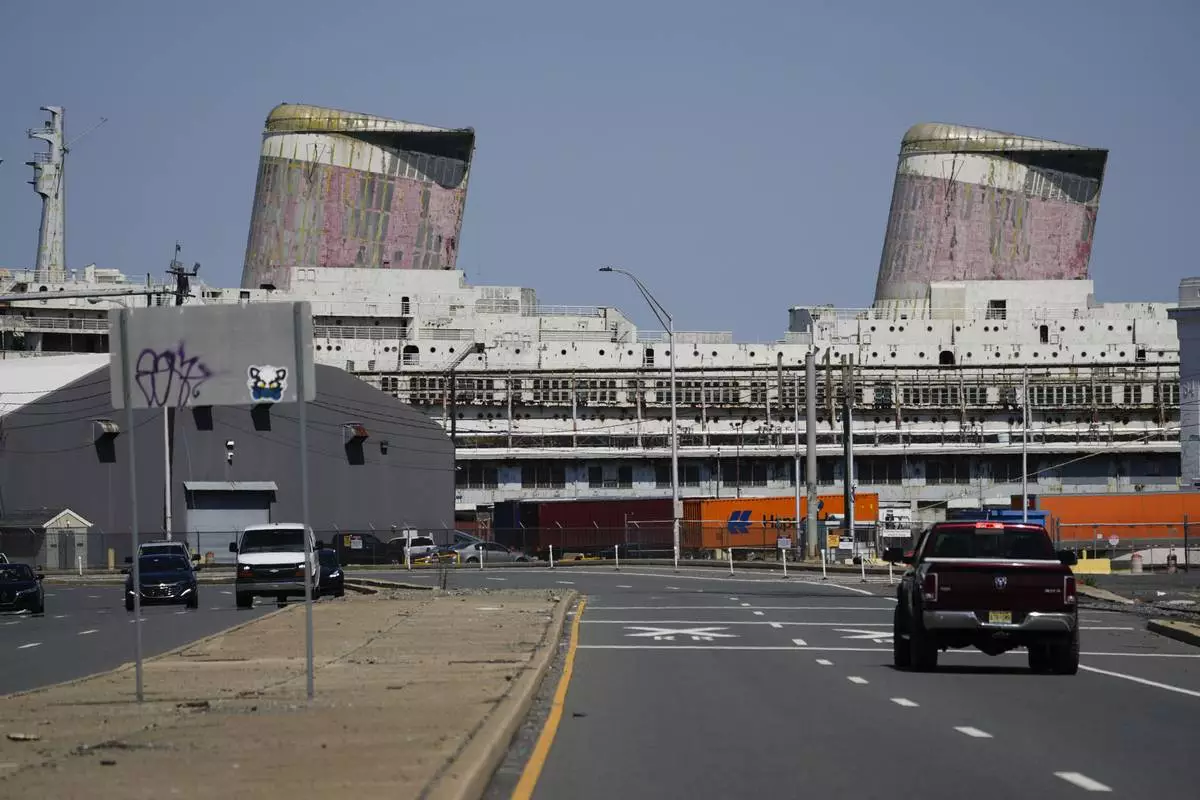
Vehicles move past the S.S. United States moored on the Delaware River in Philadelphia, Wednesday, Sept. 4, 2024. (AP Photo/Matt Rourke)
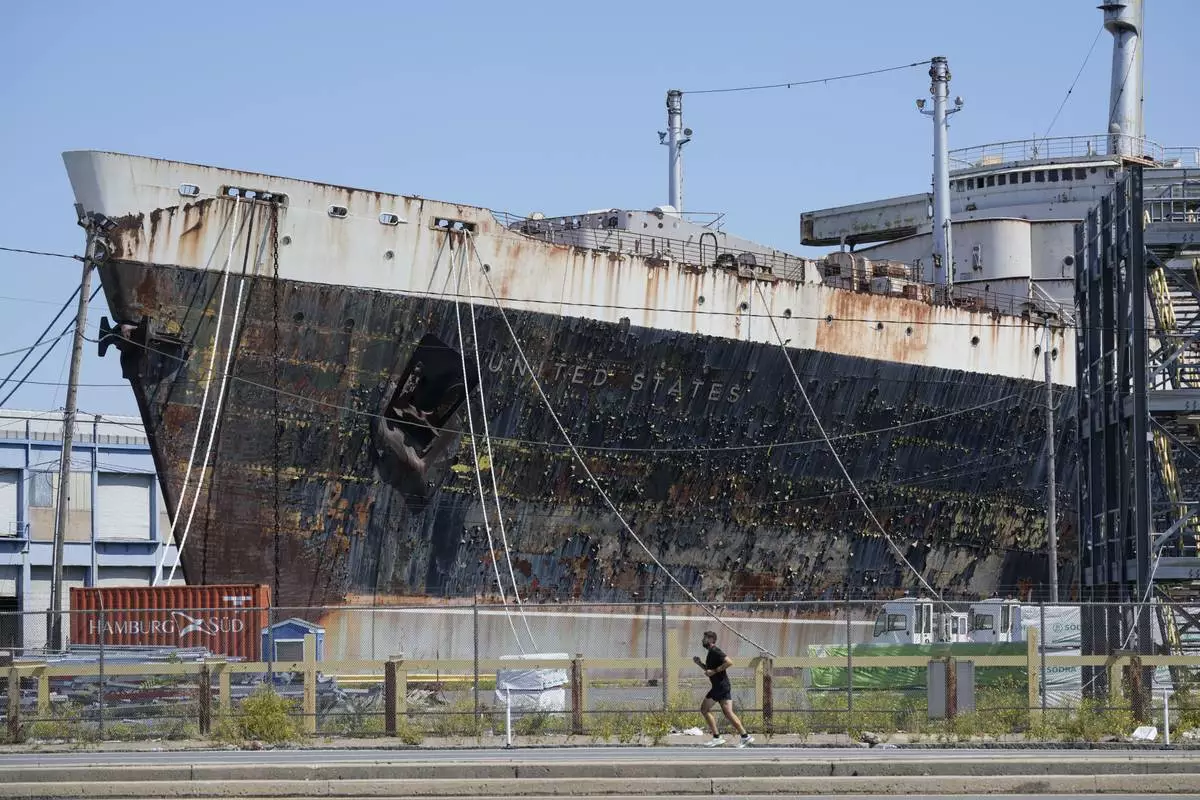
A person runs past the S.S. United States moored on the Delaware River in Philadelphia, Wednesday, Sept. 4, 2024. (AP Photo/Matt Rourke)
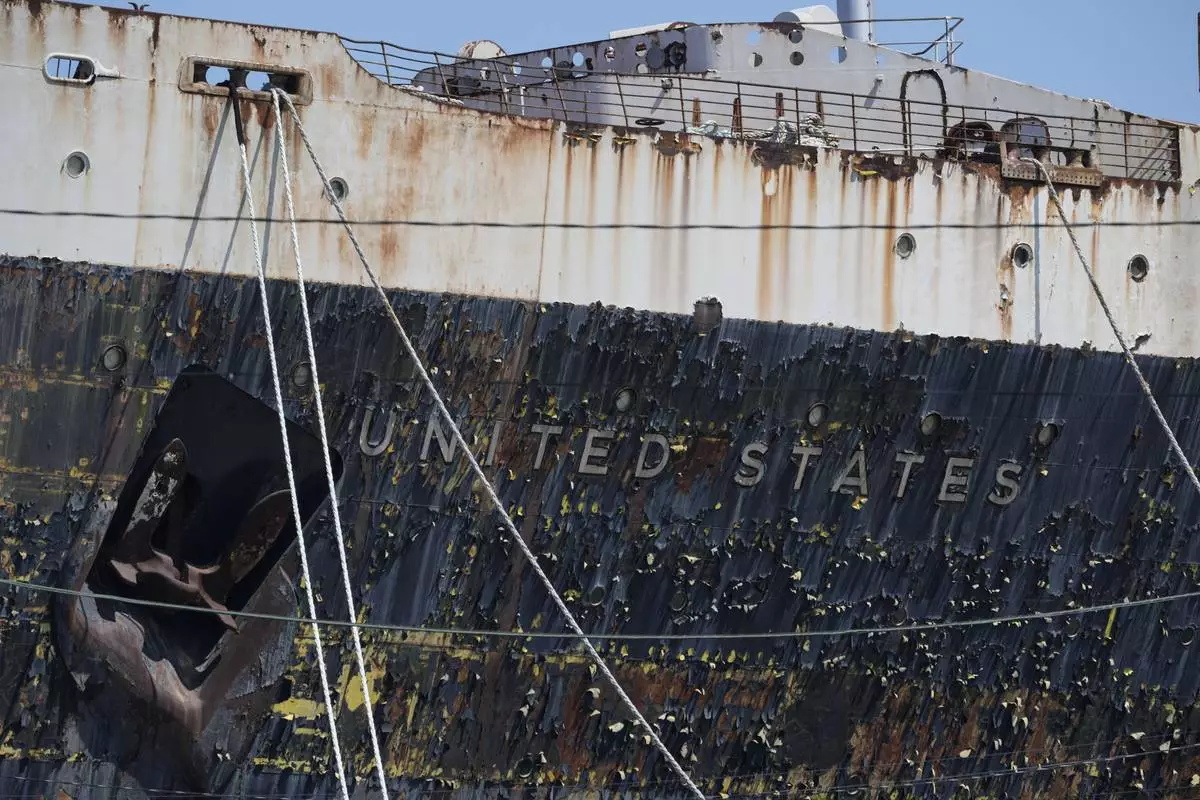
The S.S. United States is moored on the Delaware River in Philadelphia, Wednesday, Sept. 4, 2024. (AP Photo/Matt Rourke)
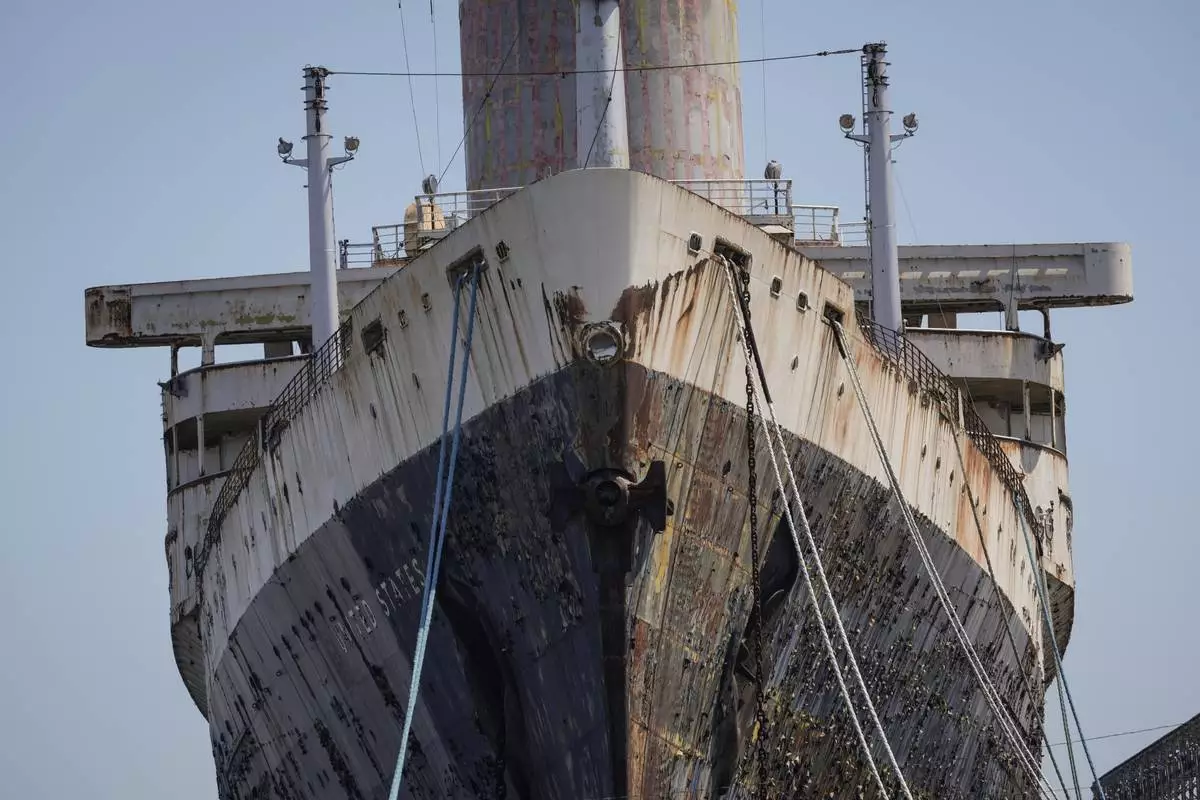
The S.S. United States is moored on the Delaware River in Philadelphia, Wednesday, Sept. 4, 2024. (AP Photo/Matt Rourke)
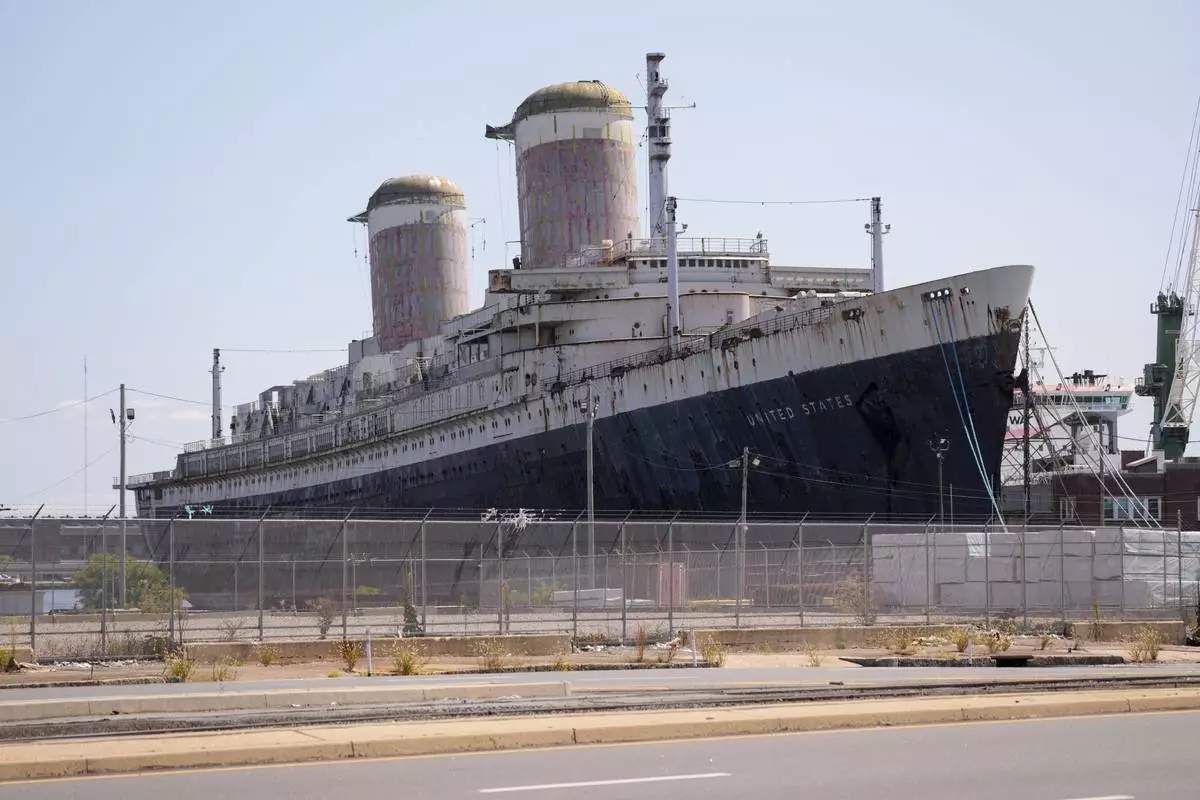
The S.S. United States is moored on the Delaware River in Philadelphia, Wednesday, Sept. 4, 2024. (AP Photo/Matt Rourke)
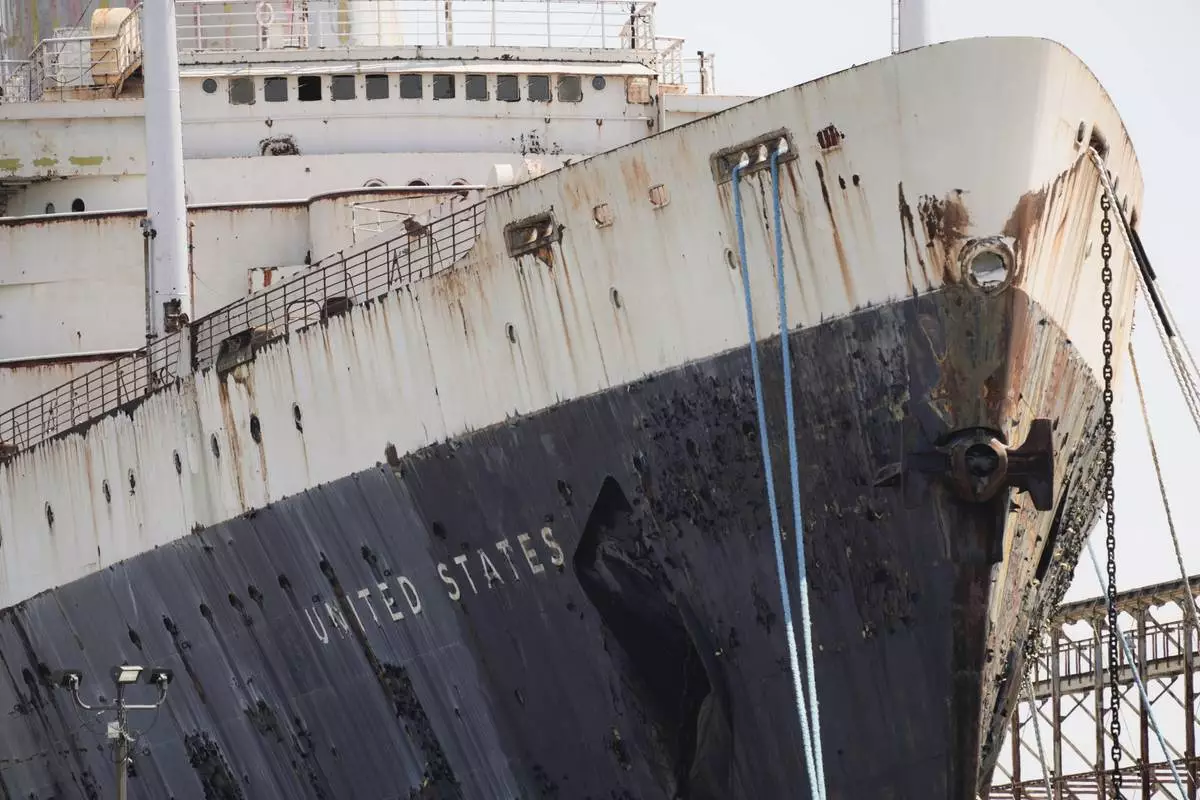
S.S. United States is moored on the Delaware River in Philadelphia, Wednesday, Sept. 4, 2024. (AP Photo/Matt Rourke)
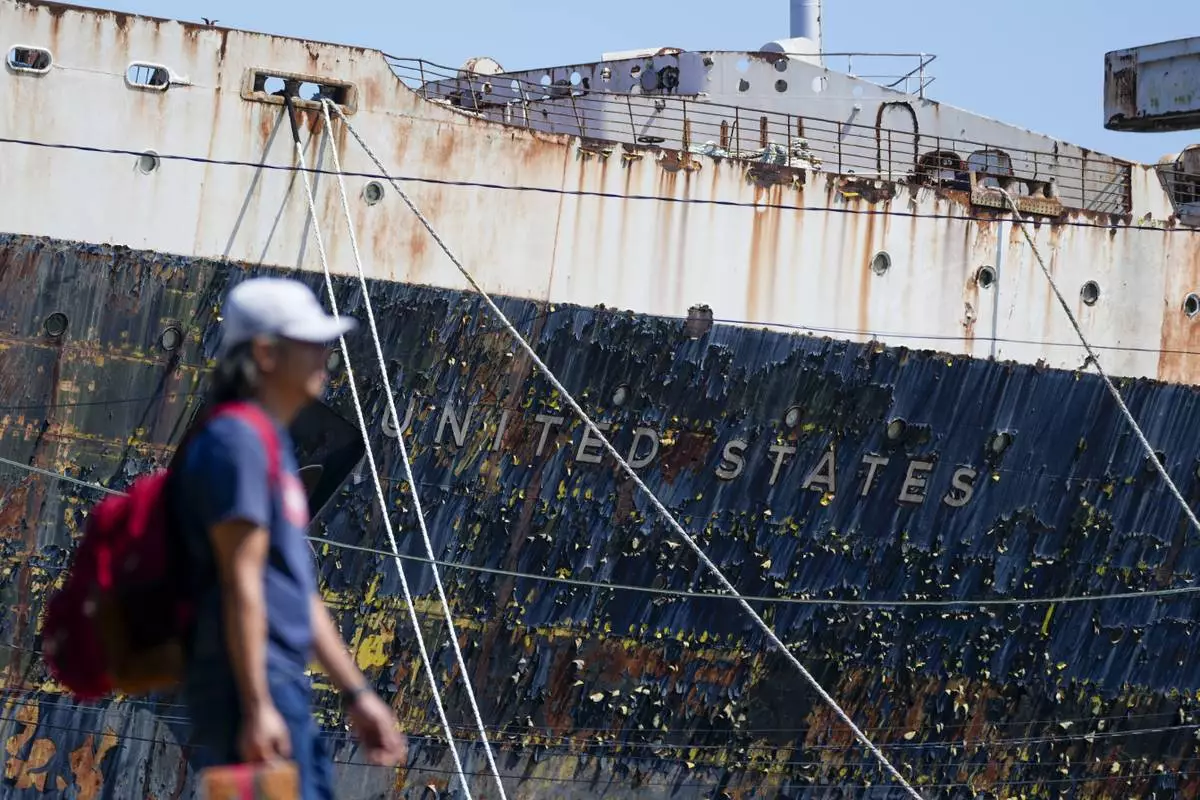
A person walks past the S.S. United States moored on the Delaware River in Philadelphia, Wednesday, Sept. 4, 2024. (AP Photo/Matt Rourke)
BASEL, Switzerland (AP) — The 69th Eurovision Song Contest will holds its grand final on Saturday night.
The Swiss city of Basel played host this week to competitors representing 37 countries. They danced, they sang, they engaged in disco diplomacy as part of one of the world’s biggest spectacles.
Semifinal performances on Tuesday and Thursday whittled the competitors down to just 26 acts. They're competing for the coveted crystal microphone trophy.
The finalists are: Norway, Luxembourg, Estonia, Israel, Lithuania, Spain, Ukraine, the United Kingdom, Austria, Iceland, Latvia, the Netherlands, Finland, Italy, Poland, Germany, Greece, Armenia, Switzerland, Malta, Portugal, Denmark, Sweden, France, San Marino and Albania.
The contest airs Saturday at 9 p.m. local time (1900GMT).
Photographer Martin Meissner from Germany switches from sports to entertainment for a week to photograph his fifth Eurovision.
This is a photo gallery curated by AP photo editors.

Tommy Cash from Estonia performs the song "Espresso Macchiato" during the first semi-final of the 69th Eurovision Song Contest, in Basel, Switzerland, Tuesday, May 13, 2025. (AP Photo/Martin Meissner)

Klavdia from Greece performs the song "Asteromata" during the dress rehearsal for the second semi-final of the 69th Eurovision Song Contest, in Basel, Switzerland, Wednesday, May 14, 2025. (AP Photo/Martin Meissner)

KAJ from Sweden performs the song "Bara Bada Bastu" during the first semi-final of the 69th Eurovision Song Contest, in Basel, Switzerland, Tuesday, May 13, 2025. (AP Photo/Martin Meissner)

Lucio Corsi from Italy performs the song "Volevo Essere Un Duro" during the first semi-final of the 69th Eurovision Song Contest, in Basel, Switzerland, Tuesday, May 13, 2025. (AP Photo/Martin Meissner)

Gabry Ponte from San Marino performs the song "Tutta L'Italia" during the first semi-final of the 69th Eurovision Song Contest, in Basel, Switzerland, Tuesday, May 13, 2025. (AP Photo/Martin Meissner)

Gabry Ponte from San Marino performs the song "Tutta L'Italia" during the first semi-final of the 69th Eurovision Song Contest, in Basel, Switzerland, Tuesday, May 13, 2025. (AP Photo/Martin Meissner)

Marko Bosnjak from Croatia performs the song "Poison Cake" during the first semi-final of the 69th Eurovision Song Contest, in Basel, Switzerland, Tuesday, May 13, 2025. (AP Photo/Martin Meissner)

Theo Evan from Cyprus performs the song "Shh" during the first semi-final of the 69th Eurovision Song Contest, in Basel, Switzerland, Tuesday, May 13, 2025. (AP Photo/Martin Meissner)

Hosts Hazel Brugger, centre right and Sandra Studer, centre left, on stage during the first semi-final of the 69th Eurovision Song Contest, in Basel, Switzerland, Tuesday, May 13, 2025. (AP Photo/Martin Meissner)

VAEB from Iceland performs the song "ROA" during the first semi-final of the 69th Eurovision Song Contest, in Basel, Switzerland, Tuesday, May 13, 2025. (AP Photo/Martin Meissner)

Justyna Steczkowska from Poland performs the song "GAJA" during the first semi-final of the 69th Eurovision Song Contest, in Basel, Switzerland, Tuesday, May 13, 2025. (AP Photo/Martin Meissner)

Klemen from Slovenia performs the song "How Much Time Do We Have Left" during the first semi-final of the 69th Eurovision Song Contest, in Basel, Switzerland, Tuesday, May 13, 2025. (AP Photo/Martin Meissner)

Miriana Conte from Malta performs the song "SERVING" during the second semi-final of the 69th Eurovision Song Contest, in Basel, Switzerland, Thursday, May 15, 2025. (AP Photo/Martin Meissner)

Mariam Shengelia from Georgia performs the song Freedom during the second semi-final of the 69th Eurovision Song Contest, in Basel, Switzerland, Thursday, May 15, 2025. (AP Photo/Martin Meissner)

ADONXS from Czechia performs the song "Kiss Kiss Goodbye" during the second semi-final of the 69th Eurovision Song Contest, in Basel, Switzerland, Thursday, May 15, 2025. (AP Photo/Martin Meissner)

Laura Thorn from Luxembourg performs the song "La Poupee Monte Le Son" during the second semi-final of the 69th Eurovision Song Contest, in Basel, Switzerland, Thursday, May 15, 2025. (AP Photo/Martin Meissner)

Yuval Raphael from Israel performs the song "New Day Will Rise" during the second semi-final of the 69th Eurovision Song Contest, in Basel, Switzerland, Thursday, May 15, 2025. (AP Photo/Martin Meissner)

Klavdia from Greece performs the song "Asteromata" during the second semi-final of the 69th Eurovision Song Contest, in Basel, Switzerland, Thursday, May 15, 2025. (AP Photo/Martin Meissner)

Kyle Alessandro from Norway performs the song "Lighter" during the first semi-final of the 69th Eurovision Song Contest, in Basel, Switzerland, Tuesday, May 13, 2025. (AP Photo/Martin Meissner)

PARG from Armenia performs the song "SURVIVOR" during the second semi-final of the 69th Eurovision Song Contest, in Basel, Switzerland, Thursday, May 15, 2025. (AP Photo/Martin Meissner)

Remember Monday from the United Kingdom perform the song "What The Hell Just Happened" during the second semi-final of the 69th Eurovision Song Contest, in Basel, Switzerland, Thursday, May 15, 2025. (AP Photo/Martin Meissner)

JJ from Austria performs the song "Wasted Love" during the second semi-final of the 69th Eurovision Song Contest, in Basel, Switzerland, Thursday, May 15, 2025. (AP Photo/Martin Meissner)

Miriana Conte from Malta performs the song "SERVING" during the second semi-final of the 69th Eurovision Song Contest, in Basel, Switzerland, Thursday, May 15, 2025. (AP Photo/Martin Meissner)

Go-Jo from Australia performs the song "Milkshake Man" during the second semi-final of the 69th Eurovision Song Contest, in Basel, Switzerland, Thursday, May 15, 2025. (AP Photo/Martin Meissner)

Claude from the Netherlands performs the song "C'est La Vie" during the first semi-final of the 69th Eurovision Song Contest, in Basel, Switzerland, Tuesday, May 13, 2025. (AP Photo/Martin Meissner)

Nina Zizic from Montenegro performs the song "Dobrodosli" during the second semi-final of the 69th Eurovision Song Contest, in Basel, Switzerland, Thursday, May 15, 2025. (AP Photo/Martin Meissner)

Louane from France performs the song "maman" during the second semi-final of the 69th Eurovision Song Contest, in Basel, Switzerland, Thursday, May 15, 2025. (AP Photo/Martin Meissner)

Tautumeitas from Latvia performs the song "Bur Man Laimi" during the second semi-final of the 69th Eurovision Song Contest, in Basel, Switzerland, Thursday, May 15, 2025. (AP Photo/Martin Meissner)









